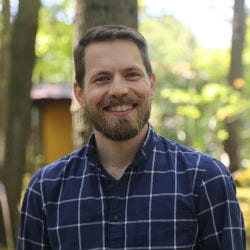Explore the digital humanities with Paul Vierthaler, STLI Fellow for Excellence in Teaching
December 1, 2023 • Vivian Hoang

When some think of disciplines in the humanities like classic and ancient studies, they may conjure images of black ink inscribed across yellowed, dog-eared pages with quill pens.
However, for one ‘23-’24 STLI teaching fellow, his goal is to break past these traditionally held notions and instead merge the past with the present, making ancient history come alive in the digital sphere.
Meet Paul Vierthaler, an associate professor of Chinese Studies at William and Mary who specializes in the digital humanities. Vierthaler comes to William and Mary equipped with an extensive background teaching a variety of courses on topics such as text-markup in discourse analysis and 3D modeling.
“Prior to coming to William and Mary, I was an assistant professor of digital humanities at Leiden University in the Netherlands, and one of our focuses was to help other faculty integrate digital tools more holistically into the classes that they teach,” Vierthaler said. “And I thought that was a great initiative and something that folks at William and Mary would really benefit from.”
Now as a fellow with STLI, Vierthaler is leading a variety of workshops focused on providing faculty with the tools to incorporate digital humanities into their courses. He says these courses are intentionally structured to be beginner-friendly to ensure that faculty of all skill levels can easily participate and leave the workshop being able to implement an assignment based on the digital tool being taught that day.
“All of the workshops assume no prior knowledge of these things and will teach you from the very basics all the way through to how to actually implement these assignments in your classes, so even if you’re maybe a little bit intimidated about the idea of digital exhibitions or text markup, these are just tools that we can use to teach our students the materials in our classes and from new angles,” Vierthaler said. “And they’re not difficult.”
To kick off his workshop series, Vierthaler has already led a successful workshop on digital curation in which he presented a plug-and-play digital curation assignment to over 40 faculty members. Faculty learned how to create a public-facing website that can link to course material and eventually be adopted in their own courses.
His next workshop on Dec. 5 centers on 3D modeling and invites faculty to learn how to adapt cultural artifacts to the virtual world.
This workshop strongly aligns with Vierthaler’s scholarly interests. Teaching classes at William and Mary like Hacking Chinese Studies, Vierthaler has been especially passionate about making ancient texts that are often disregarded or difficult to comprehend more easily accessible to general audiences, which he says can often be done through virtual mediums and algorithms.
“Hacking Chinese Studies is designed as an introduction for students to the digital humanities and how they might use computers to study human culture, specifically with a focus on Chinese culture,” Vierthaler said. “So students come in having no familiarity with what digital humanities might be, and they learn how to program and do text mining and data visualization and just explore how computers might be beneficial for us as people who study culture.”
Other future workshops will cover topics such as Voyant Tools, mapping, text annotation, and algorithmic text-mining. He ultimately hopes that these workshops will allow faculty to gain many different strategies for bolstering student engagement in their classes.
“Students are really interested in learning about these things, and I think there is a perception that students these days already have a really strong grasp on how to do these sorts of things,” Vierthaler said. “But I think when the rubber meets the road, in a lot of cases, they flounder as much as we do, so by bringing these sorts of things into your classes and integrating technology in new and creative ways, you’re giving students new tools while also hopefully making your class entertaining for the students.”